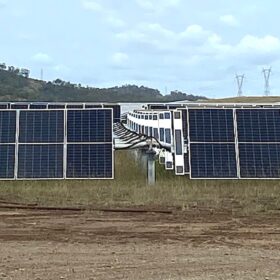The coal-rich region of Gippsland, which spans Victoria’s east, is moving to establish itself as a hydrogen centre of excellence, with fuel cell focussed startup H2X today announcing it will develop plans to manufacture in the region as part of a deal with the Gippsland Circular Economy Precinct (GCEP) proprietary limited company. The pair will look into producing hydrogen fuel cells, electrolysers, hydrogen-powered vehicles, as well as hydrogen power units including generators and emergency power supplies as part of the ambitious deal.
GCEP is a consortium of Gippsland-based businesses including Ferguson Civil, Solis RE and Nexsys Industries Consulting, which say they are driven by a shared desire to develop an integrated hydrogen economy in the region. With a long history in coal, Gippsland’s high level of engineering, power generation and manufacturing expertise was a major factor in the decision to establish the centre of excellence and renewables precinct in the area, executive director of GCEP, Brett Singh, said. So far, the members of GCEP have fostered significant investment in the region, securing Octopus Investments Australia and the Clean Energy Finance Council (CEFC) as investment partners who have wholly acquired the region’s Perry Bridge and Fulham Solar Farm projects. With the electricity from these projects, GCEP is looking to support green hydrogen initiatives.
Bringing in the fast growing H2X outfit, which has multiple arms stretching across the globe, is expected to help fast track the Gippsland precinct plans.
Less than a week ago, ASX-listed hydrogen producer Pure Hydrogen bought a 24% stake in H2X Global. The deal will see Pure Hydrogen become H2X’s preferred hydrogen supplier, and will usher in a new joint venture company, Pure X Mobility, which will develop and sell hydrogen fuel cell utility vehicles like waste disposal trucks and concrete agitators.
H2X is planning to unveil a range of hydrogen fuel cell electric vehicles (FCEVs) over the next 24 months, including everything from trucks and buses to light vehicles like the Warrego ute which the company launched to much fanfare in September. The company is also looking to target the agricultural industry and create farm-ready machines, according to the company’s corporate affairs specialist, Tony Blackie.
It appears the fuel cells and some of H2X’s future vehicles may well be manufactured in Gippsland, with the return of manufacturing capabilities to Australia having long been the vision of H2X’s CEO, Brendan Norman. H2X says its facilities, coupled with work from the Gippsland Circular Economy Precinct, will provide new jobs and training to transition the region from legacy power generation at Hazelwood, Yallourn and Loy Yang coal fire generators to a fresh new hydrogen economy.
This content is protected by copyright and may not be reused. If you want to cooperate with us and would like to reuse some of our content, please contact: editors@pv-magazine.com.









4 comments
By submitting this form you agree to pv magazine using your data for the purposes of publishing your comment.
Your personal data will only be disclosed or otherwise transmitted to third parties for the purposes of spam filtering or if this is necessary for technical maintenance of the website. Any other transfer to third parties will not take place unless this is justified on the basis of applicable data protection regulations or if pv magazine is legally obliged to do so.
You may revoke this consent at any time with effect for the future, in which case your personal data will be deleted immediately. Otherwise, your data will be deleted if pv magazine has processed your request or the purpose of data storage is fulfilled.
Further information on data privacy can be found in our Data Protection Policy.